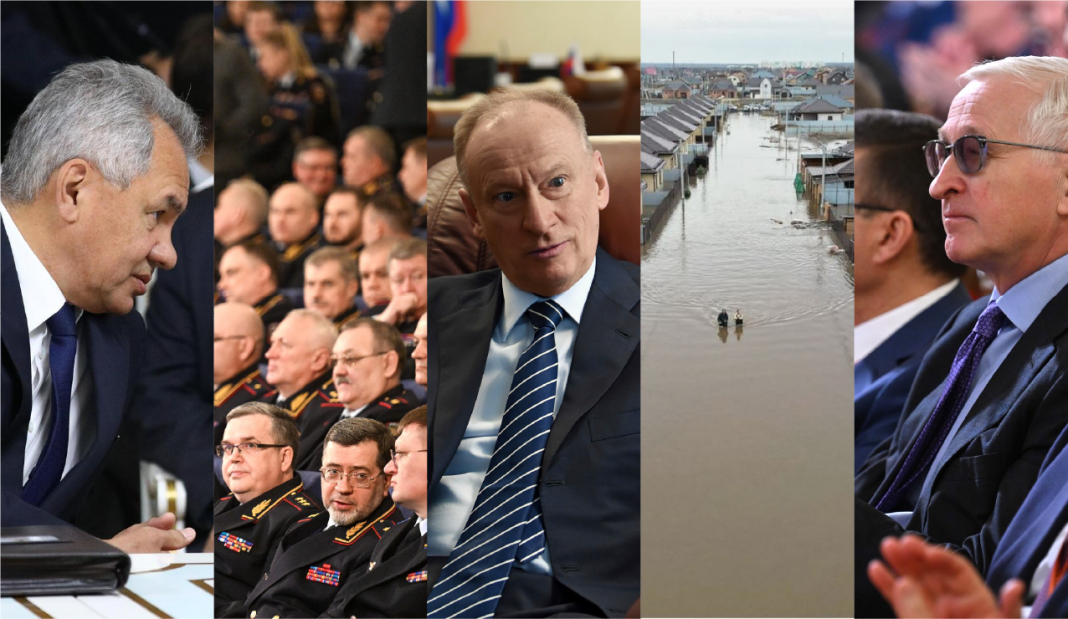This report describes the key events which significantly influenced Russia’s political, economic, and social processes.
Assessing the past week’s results, we determine the following trends:
• Russia has repeatedly spoken about its readiness to negotiate with Ukraine, but in essence, this is nothing more than negotiations on the surrender of Ukraine, which neither Ukraine nor the West can agree to. Russia is ready to consider several points: a) negotiations on the fate of Ukraine with the United States or NATO; b) recognition of current conquests as sovereign territories of the Russian Federation (state border along the current front line); c) demilitarisation of Ukraine; d) Ukraine’s refusal to join NATO and state neutrality according to the Austrian model. Therefore, all Russian statements regarding readiness for negotiations indicate precisely the opposite – Russia’s unpreparedness for honest negotiations based on international law and treaty obligations.
• The man-made disaster in the Orenburg region and the Altai Territory indicates the critical state of infrastructure in several federal subjects, which will invariably affect the economic component. Obviously, this issue will soon become very relevant for the central authorities and an area that can adjust both Russia’s military plans and Putin’s action program for the next six years.
• Among experts, the name of Russian Presidential Aide Dmitry Mironov was mentioned as a possible successor to Kolokoltsev as minister. But, apparently, the events at Crocus City Hall led to the understanding that at the moment, Kolokoltsev must be left, especially since he repeatedly initiated restricting migration flows and strengthening control over migrants. At the same time, several people from Putin’s inner circle (primarily the Rotenbergs, Sobyanin, and Sechin, interested in cheap labour) lobbied for the maximum influx of unskilled personnel from Central Asia.
This digest covers the following topics, which were the most relevant for Russia between the 1st and the 7th of April:
1. An extended meeting of the board of the Ministry of Internal Affairs;
2. Floods in the Altai Territory and Orenburg Region;
3. Meeting with members of the Government;
4. Meeting with permanent members of the Security Council;
5. Congress of the Federation of Independent Trade Unions of Russia;
6. Interview with Nikolai Patrushev;
7. New declarations about readiness to negotiate a cessation of hostilities in Ukraine.
This Content Is Only For Subscribers
- An extended meeting of the board of the Ministry of Internal Affairs
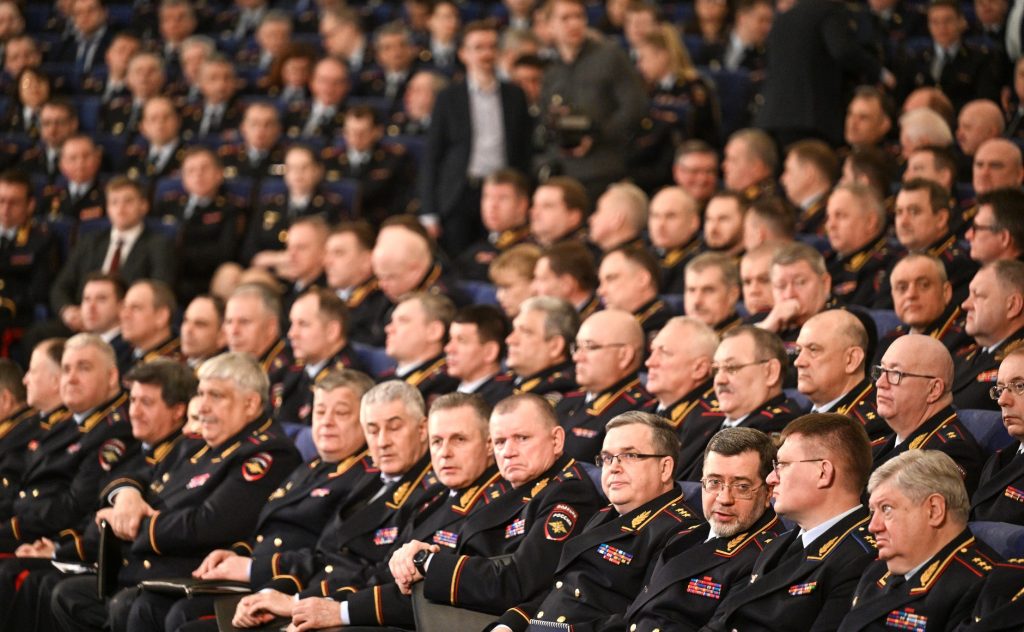
On Tuesday, April 2, Vladimir Putin took part in the annual extended meeting of the Russian Ministry of Internal Affairs board, where he addressed representatives of law enforcement agencies. This year’s official theme of the board was priority tasks in various areas of operational activities, including ensuring public order, combating extremism, suppressing illegal migration, the work of precinct services, and the actions of the Ministry of Internal Affairs to neutralise organised crime. The head of the Russian Ministry of Internal Affairs, Vladimir Kolokoltsev, also delivered a keynote speech.
Key theses:
- Putin: “Please pay special attention to such priorities as ensuring public order, combating extremism, suppressing illegal migration, the work of local services, as well as the actions of the Ministry of Internal Affairs to neutralise organised crime. Bearing in mind that such groups, and sometimes we are talking about real criminal syndicates, are often cross-border in nature, acting hand in hand with foreign intelligence services and emissaries of international radical, extremist structures. Such criminal communities are tied to human trafficking, illegal weapons trafficking, financial and cybercrimes, and drug trafficking.”
- Putin: “So, recently, in Russia, there has been an increase in the consumption of the most difficult and dangerous synthetic drugs. The Ministry of Internal Affairs, the FSB, other intelligence services, and the Federal Customs Service need to seriously intensify efforts to identify the places of production of this potion, sources of foreign raw materials, and suppress supply and trade channels.”
- Putin: “One of the key tasks is to strengthen close coordination of all law enforcement and special services. We must proceed from the fact that today internal and external threats are often intertwined and equally directed against our citizens and society, to contain Russia, and to undermine our sovereignty.”
- Putin: “We paid a very high price. And the entire analysis of the situation must be extremely objective and professional. This is important, first of all, to bring to a new level the provision of law and order and security in places where people are in large numbers: at sports facilities, transport, shopping and entertainment centres, schools, hospitals, universities, theatres and so on. All these objects must be under constant control. And the internal affairs bodies are called upon to play a key role in solving this problem.”
- Putin: “I’ll give you a very revealing figure. In a tough situation, when hostilities continue, more than three million 200 thousand residents of the [self-proclaimed] Donetsk and Lugansk People’s Republics, the [temporarily occupied] Zaporizhzhia and Kherson regions have received passports of citizens of the Russian Federation.”
- Putin: “At the same time, it is unacceptable, I want to emphasise, to use recent tragic events to provoke national hatred, xenophobia, Islamophobia and so on. This was the main goal of the terrorists and their customers – first of all, to sow discord and panic, discord and hatred in our country, to split Russia from within. This is their main task. We must under no circumstances allow them to do this.”
- Putin: “The most important task remains the principled, consistent fight against corruption, which poisons society, breaks law-abiding businesses, and steals the money necessary for the defence of the country, for its movement forward in the economy and social sphere—this fully applies to ensuring internal security of the Ministry of Internal Affairs system itself.”
- Putin: “And one more important point. Thanks to implementing the national “Safe Quality Roads” project, many federal highways and transport infrastructure in large agglomerations were updated. As you know, special emphasis will be placed on developing a network of regional and local roads. This means that traffic flows will grow and speeds will increase. Therefore, I expect the traffic police officers to actively implement advanced safety technologies, modern means and methods of organising traffic. And, of course, it is important to engage in educational work to cultivate a culture of responsible behaviour on the roads, starting from school and maybe even preschool age. Here, unfortunately, we have seen an increase in road accidents by 4.5 per cent, and the number of deaths has increased: last year, 14.5 thousand people died on the roads, and 166.5 thousand were injured. Now we will renovate the roads; it is necessary that this be accompanied by increased safety on the roads.”
- Kolokoltsev: “The past year for the internal affairs bodies and the country as a whole was difficult and responsible. The criminal actions of the Ukrainian regime and the attempts of the collective West to create tension within Russia continued. At the same time, we managed to maintain control over the operational situation and the state of law and order and, in a number of areas, increase the efficiency of our official activities.”
- Kolokoltsev: “Last year, almost one ton of prohibited substances, 1,700 weapons, and one and a half million rounds of ammunition were seized. For the purpose of passporting citizens, up to 150 population reception points were deployed, and over 2.5 thousand employees were involved. The main work was completed back in September, which made it possible, despite the martial law, to ensure the holding of elections.”
- Kolokoltsev: “Within the framework of its powers, the ministry has implemented a set of measures to ensure the introduced special legal regimes and various levels of response. In the regions bordering Ukraine and new regions, consolidated police units continued to provide assistance. In cooperation with the Russian Guard, the Federal Security Service, and the Ministry of Defense, last year, they took part in almost three thousand joint events. More than 900 criminal offences and 32 thousand administrative offences were identified during their implementation.”
- Kolokoltsev: “Taking into account modern realities, the functionality in the field of using robotic systems, unmanned aerial vehicles, and means to counter them has expanded. The corresponding centre was formed within the structure of our research and production association of special equipment. Ninety-one units have been created in territorial bodies at the regional and district levels to carry out tasks in these areas.”
- Kolokoltsev: “Russian police peacekeepers are an important institution representing both the ministry and the country on the world stage. Last year, 51 employees took part in UN and OSCE missions.”
- Kolokoltsev: “We monitor and organise blocking of network resources containing criminal appeals. We carry out explanatory work and hold violators accountable. Notably, the number of participants in uncoordinated actions decreased noticeably last year. Measures have been taken to identify citizens engaged in sabotage activities and accomplices of the Kyiv regime. Since the beginning of the special operation, 438 persons have been identified as being involved in attacks and arson of administrative buildings, including military registration and enlistment offices, as well as railway transport facilities.”
- Kolokoltsev: “Measures were taken to remove persons illegally staying in the country. Almost 110 thousand such violators were expelled and deported. This is 65 per cent more than a year earlier.”
- Kolokoltsev: “Significant efforts have been focused on protecting the economy. The police have identified 41 thousand people involved in criminal attacks in this area. Preliminary investigation of 15 thousand economic crimes committed as part of the group. Illegal financial schemes were stopped, and together with Rosfinmonitoring, the activities of 10 shadow platforms with a total turnover of 28 billion rubles and 14 financial pyramids were stopped. The aggressiveness in combating corruption has been maintained. The internal affairs bodies have documented 27 thousand attacks in this category, half of which are bribery facts.”
- Putin: “Russia, as we know, is in a difficult period in its history. This is clear to everyone; everything is clear in this sense. After the collapse of the USSR, our geopolitical ill-wishers, of course, set themselves the goal of destroying what was left of historical Russia, that is, destroying its core, Russia itself, the Russian Federation. And subordinate everything that remains to your geopolitical interests. I speak confidently about this as a former director of the FSB, as a former secretary of the Security Council, and then President and Supreme Commander-in-Chief.”
- Putin: “Oddly enough, someone wants revenge for failures in the fight against Russia back in historical periods: for Hitler’s unsuccessful campaigns against Russia, Napoleon – there are a lot of such historical examples, and, oddly enough, in the historical memory of those very of the ill-wishers I mentioned, a lot remains, oddly enough, but I have encountered this – surprising, but true.”
- Putin: “And someone strives to ensure that, in today’s rapidly changing world, they maintain their hegemony, including at our expense – naturally, a huge territory, human resources, natural resources, and so on – to do this, among other things and at the expense of Russia after its possible robbery.”
- Putin: “And to be successful, we need to be collected, to work effectively, each in his area. Here, I repeat: the economy, the social sphere, and internal peace in society are important. Yes, people came and voted in the presidential elections – this is people’s hope for our joint work, and for its effectiveness, I draw attention. Yes, of course, your humble servant was the candidate who received a record number of votes, but this expresses the sentiments of citizens towards society and the state as a whole, all authorities, not least the Ministry of Internal Affairs. The role and importance of the Ministry of Internal Affairs in all these areas is extremely high in the economy, in the social sphere, in the fight against crime, in the fight against corruption, and so on. The internal state of our society largely depends on how effectively you work – an essential thing.”
Outcomes and outlook:
In the Russian Federation, this event was regarded as an expression of confidence in Minister Kolokoltsev on the part of the President. For a long time, information was spread that Putin was going to replace Kolokoltsev, for whom many comments had accumulated. In addition, the minister was not a member of any political informal association (he did not belong to any of the Kremlin “towers”) and therefore had little protection from possible disgrace or resignation. There were many questions about the police and the Ministry of Internal Affairs itself.
Among experts, the name of Russian Presidential Aide Dmitry Mironov was mentioned as a possible successor to Kolokoltsev as minister. But the events at Crocus City Hall led to the understanding that at the moment, Kolokoltsev must be left, especially since it was he who repeatedly initiated restricting migration flows and strengthening control over migrants. At the same time, several people from Putin’s inner circle (primarily the Rotenbergs, Sobyanin, and Sechin, interested in cheap labour) lobbied for the maximum influx of unskilled personnel from Central Asia.
- Floods in the Altai Territory and Orenburg Region
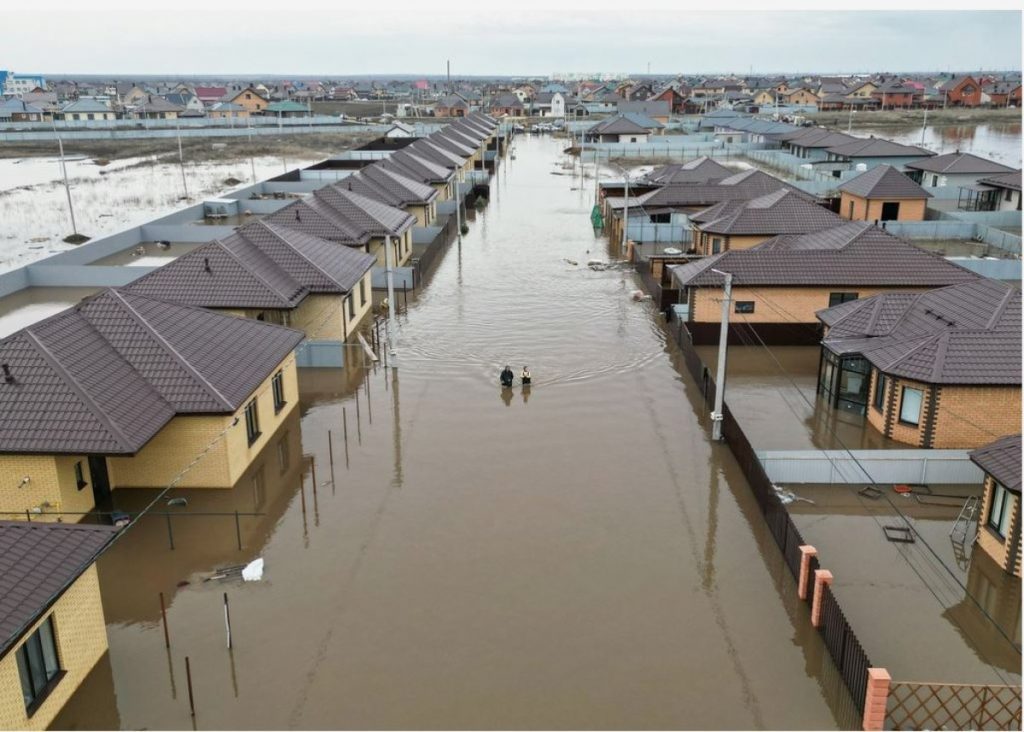
Back at the end of March, the situation with spring floods sharply worsened in some regions of Russia. Thus, on March 30, in the Orenburg region, traffic on 34 bridges was limited due to the high risk of road flooding. Already on April 4, a state of emergency was introduced in the same area, as the water level reached a critical level and residential buildings began to flood. On the same day, the evacuation of about three thousand local residents was announced. However, already on April 5, in the city of Orsk (Orenburg region), a dam broke, as a result of which more than 11 thousand local residents found themselves in the flood zone.
On Sunday, April 7, Orsk authorities said the flood situation was developing according to the worst-case scenario. The head of the Russian Ministry of Emergency Situations also called the situation in the city critical. In addition, the flood situation has increased significantly in the Altai Territory, Kurgan and Tyumen regions. As of April 7, flooding of 121 houses and 513 household plots was announced in the Altai Territory.
At the same time, the total losses from the flood in the Orenburg region alone are estimated at more than 26 billion rubles.
Outcomes and outlook:
The man-made disaster in the Orenburg region and the Altai Territory indicates the critical state of infrastructure in a number of federal subjects, which will invariably affect the economic component. This issue will soon become very relevant for the central authorities and an area that can adjust Russia’s military plans and Putin’s action program for the next six years.
Moreover, high economic losses, which are already being recorded and continue to grow, in addition to military plans, may also affect the adjustment of the strategy for implementing the recent Address of the Russian President. In any case, this man-made disaster can be considered as a situational instrumental opportunity for the outside world.
- Meeting with members of the Government
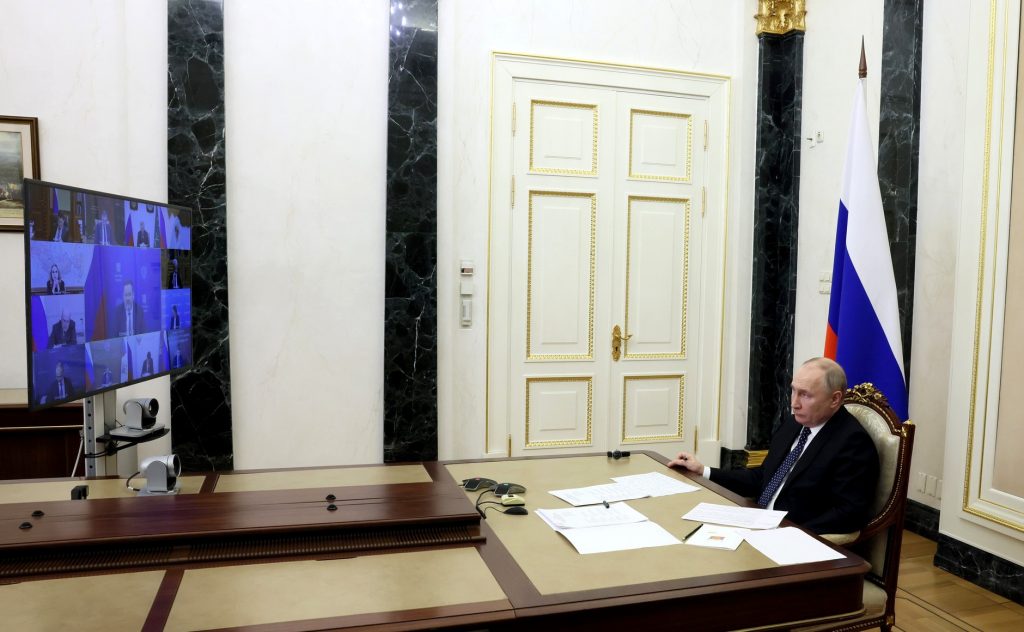
On Thursday, April 4, Vladimir Putin held an online meeting with members of the Russian Government. The main topic of the meeting was the results of implementing individual regional development programs and plans for their extension for 2025–2030. Presentations were made by the Minister of Economic Development, Maxim Reshetnikov, the Governor of the Chelyabinsk Region, and the Chairman of the State Council Commission on Economics and Finance, Alexey Teksler.
Key theses:
- Golikova (Deputy Chairman of the Government): “Today, based on the legally established qualification of 14–35 years, this category in the Russian Federation amounts to 37 million people – almost a quarter of the country’s population. Two-thirds live in cities. 5.3 million young families and children are growing up in these families – that’s another 3.9 million such families.”
- Golikova: “According to the demographic forecast, by 2030, the share of young people aged 14 to 24 will increase by 2.7 million. This means an increase in students at school, college, and university; this means getting a first job; that is, this is a holistic track for a young person. Based on our understanding of this process, we considered it important to consider the specifics of each age period, starting with raising a child in a family.”
- Golikova: “Today, there are more than 25 thousand thematic platforms of various levels, and about a million people annually become participants in the forums. I want to say that there are results; we are conducting sociological measurements. Over the past five years, the proportion of young people who believe in the possibilities of self-realisation in Russia has increased from 64 to 81 per cent, and those who feel proud of the country have increased from 58 to 92 per cent. There has also been a tendency towards an increase in the share of proactive, patriotic-minded youth. In 2022, VTsIOM conducted such a measurement for the first time, [according to which the share was] 36 per cent, in 2023 – already 40 per cent. Therefore, to form an active civic position among young people, prevent interethnic and interfaith conflicts, counter the ideology of terrorism and prevent extremism, we are developing a network of regional coordination centres. Today, nine vector and 83 coordination centres ensure the implementation of tasks on the ground.”
- Golikova: “We see a positive trend towards reducing youth unemployment. Its level decreased from 6.8 per cent in 2019 to 5.1 per cent in 2023. Of course, this cannot but worry us because you and I know that the latest indicators for February 2024 indicate that the unemployment rate, according to the methodology of the International Labor Organization, is 2.8 per cent. The youth unemployment rate, as I already said, is 5. 1 per cent.”
- Golikova: “In addition, we see a trend that indicates a shift in the educational choice of Russian youth in favour of secondary vocational education. Sixty-six per cent of ninth-grade graduates now choose secondary vocational education. Back in 2019, there were 48 percent. College graduates have the opportunity to continue their studies at universities. However, we are already seeing a steady tendency for them to choose a profession still and go to work after graduating from secondary vocational education. This percentage has already increased by six points.”
- Kotyakov (Minister of Labor and Social Policy): “Indeed, over the past three years, the youth unemployment rate has decreased by more than one and a half times – to 5.1 [per cent]. The employment situation has improved even in the most difficult age group – among applicants under 24. Here we are seeing a decline in unemployment by more than a third.”
- Kotyakov: “Today, every tenth teenager receives his first work experience before 18. And last year, employment centres helped 600 thousand young people find part-time work during the holidays – twice as many as three years ago.”
- Falkov (Minister of Science and Higher Education): “Our absolute priority is the identification and education of talented youth, assistance in self-realisation, and, of course, in building a career, primarily in the field of science, technology and technological entrepreneurship, as prescribed by the updated strategy for scientifically—technological development of the country.”
- Falkov: “Today, domestic science is one of the youngest in the world; almost every second researcher today is under 39 (44 per cent). At the same time, last year there was an increase in the number of scientists under the age of 39, which suggests a reversal of the long-term trend.”
- Falkov: “It is essential that every project of technological sovereignty now includes a personnel section. For example, in the approved national project “Unmanned Aviation Systems,” there is a federal project called “Personnel”, and by 2030, about a million specialists will be trained for this industry: from UAV operators to development engineers.”
- Kravtsov (Minister of Education): “First, the share of practical training [in colleges] today is about 80 per cent.”
- Kravtsov: “Secondly, we have seriously updated educational standards, especially in the field of the military-industrial complex, engineering specialities for the specific tasks of enterprises. Fifty-five per cent of [college students] today are studying engineering. Previously, five or six years ago, there were many lawyers and economists. These are good specialities, but today, we need to develop engineering education, including in the structure of secondary vocational education.”
- Kravtsov: “Third, one and a half thousand laboratories in colleges have been equipped, and their equipment – 80 per cent – is Russian-made. We are doing this work with the Ministry of Industry and Trade.”
- Kravtsov: “And fourth, our colleges can already open their enterprises, educational and production plants. It is also essential for young people to try themselves in business and small entrepreneurship. We have already created about a thousand college enterprises, and we will continue this work. Here, youth participate in developing unique products; defence college enterprises create defence products. This is very important and very much in demand.”
- Reshetnikov (Minister of Economic Development): “Each region was allocated five billion rubles for five years, and each subject of the Russian Federation was assigned a curator – an industry department, usually a ministry. Based on this, about 240 events were designed in programs. To date, almost half of all activities have been completed. It is already clear that targets are being met ahead of schedule. More than 14 thousand jobs have been created – 83 per cent of the plan by the end of the year. The investment plan has already been exceeded, and more than 100 billion rubles have been raised. This allowed the regions to develop at rates higher than the Russian average regarding key socio-economic indicators.”
- Reshetnikov: “With the advent of sanctions, we, together with the regions, adjusted individual programs. The focus was on projects that provided maximum economic effects and created new supply in priority sectors. This was primarily agriculture, manufacturing and tourism.”
- Reshetnikov: “When forming a new list of regions, we propose to be guided by four previous indicators: unemployment, poverty, personal income, and investment. Also, at the Ministry of Finance’s proposal, we propose to add two new ones—the volume of tax and non-tax revenues of the regions and the level of estimated budgetary provision.”
Outcomes and outlook:
Putin decided to emphasise that the state is ready to turn its face to the problem of youth, vocational education and youth programs in the state. On the eve of the elections, this topic was not particularly popular – young people are reluctant to vote in elections, and, moreover, they are primarily in opposition. But in general, the authorities (perhaps belatedly) are trying to improve relations with young people, show new social elevators, and show interest – after all, if you don’t take youth programs seriously now, then in a few years, young people may become the regime’s gravedigger.
- Congress of the Federation of Independent Trade Unions of Russia
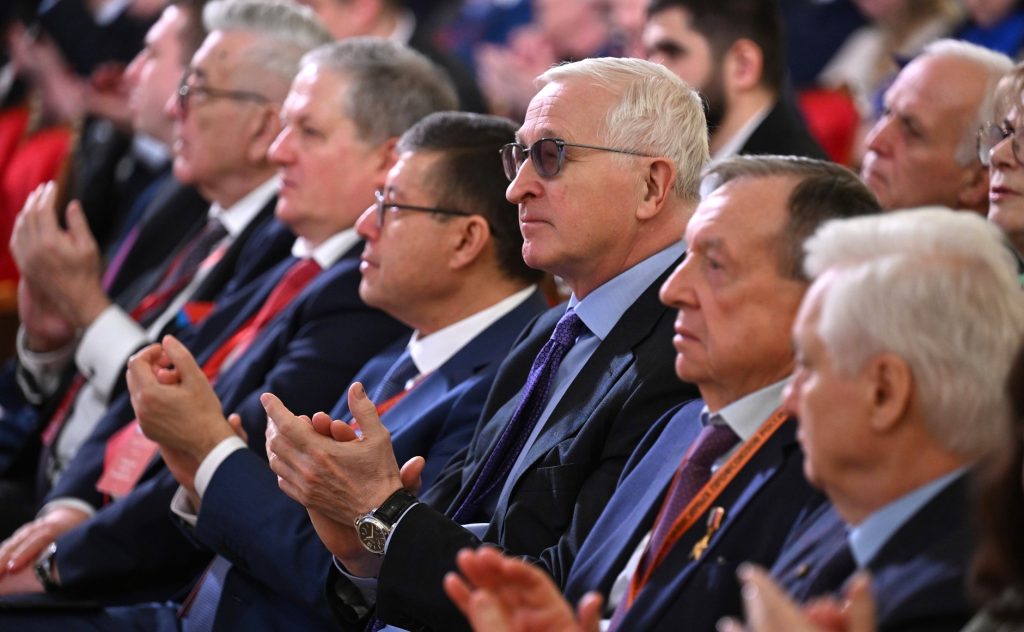
On April 3–5, the XII Congress of the Federation of Independent Trade Unions of Russia took place in Moscow. More than 600 delegates participated in this event: leaders of trade unions and trade union associations, representatives of government bodies, chairmen of trade union committees of primary trade union organisations, veterans of the trade union movement, heads of educational institutions of trade unions, youth councils and commissions. It is also reported that representatives of national trade union centres from ten countries are present as guests. Also, on April 4, Vladimir Putin addressed the participants of the Congress of the Federation of Independent Trade Unions of Russia.
Key theses:
- “I know, including from my experience of working in the Government, that sometimes very tense disputes and heated discussions occur in the commission. I must say that this has always been the case, and now the same happens when I attend joint meetings with the Government. Some issues are discussed, and some colleagues talk about the advisability of making certain decisions, but some Government representatives say no to this. The trade unions won’t let it through if it doesn’t pass.”
- “The signing of another tripartite general agreement between the Government, employers and trade unions is scheduled for the near future. Among his priorities are forecasting the country’s personnel needs, developing targeted training mechanisms, popularisings blue-collar professions and increasing the social protection of workers. I hope for your fruitful cooperation in all these areas, especially since they are an integral part of the upcoming large-scale work to achieve national development goals.”
- “As it was said in the Message, next year the national project “Personnel” will be launched. I am confident that trade unions will take an active and interested part in its implementation. We will continue strengthening the link between education levels and establishing close partnerships with employers. I am referring to the development of the career guidance system, which is already operating in the country’s schools, the implementation of the federal project “Professionality”, within the framework of which, based on updated educational and production centres, in the context of the requirements imposed by business, about a million specialists in blue-collar professions will be trained for industries economy, including electronics, IT technologies, pharmaceuticals, light industry, aircraft and shipbuilding, and so on. In the future, cooperation between educational organisations and enterprises will cover the entire secondary education system, including training for schools, hospitals and clinics, service sector, tourism, etc.”
- “Further. As was said in the Address, the next six years should be a time of accelerated industrial development in Russia. The share of domestic goods in our domestic market should increase in equipment, machines, vehicles, medicines, consumer goods, etc. We can and will produce all this ourselves in much larger volumes than now. What is it? You and I understand that these are structural changes in the economy, ensuring its growth rates, GDP growth rates and decent wages. We don’t have much choice: import labour from abroad or increase labour productivity.”
- “I would like to emphasise again: only where work is decently paid, where people and their working conditions are taken care of, will professional, qualified personnel work. In modern conditions, this is not an empty phrase; it is generally clear to all experts: factors such as the level of training of specialists, education, and healthcare have become real factors in production efficiency. This is the future. Only there will globally competitive products be produced, which means that only there will truly sovereign development be possible. This is exactly the task we set for ourselves.”
- “Our common goal is to ensure that future generations of Russia fully share these values. So that today’s schoolchildren, students, young people – as they say, from the school bench – develop respect for honest, responsible work. So that they grow up following the examples of our outstanding compatriots, representatives of labour dynasties.”
Outcomes and outlook:
Trade unions in Russia (as well as in the post-Soviet space in general) are a decorative formation on which processes in the sphere of labour relations have little influence and which have not protected the interests of individual workers for a long time. In essence, we are talking about a new attempt by the state to strengthen the imitation functionality of trade unions – nothing more. But in general, the government can try to play several instruments that can be credited to the trade unions – in particular, increasing wages and strengthening the social responsibility of business. All this is already spelt out in Putin’s program. Therefore, only one thing is required from trade unions: to support and bless.
- Meeting with permanent members of the Security Council
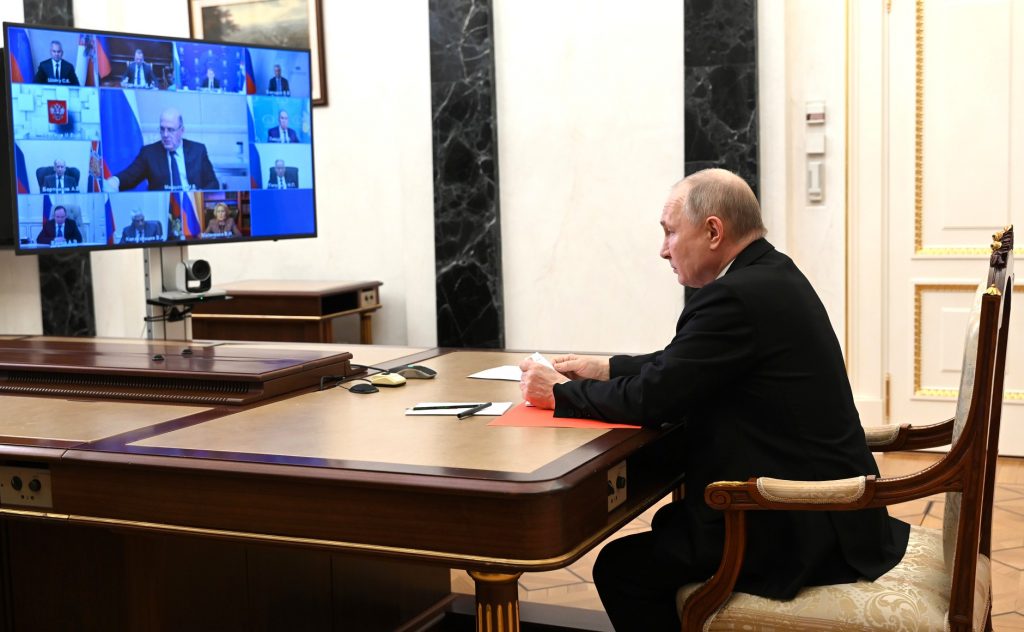
On Friday, April 5, Vladimir Putin held a regular online meeting with permanent members of the Russian Security Council. According to official data, the main topic of the meeting was the issue of increasing the efficiency of work with organized crime and its manifestations. The Minister of Internal Affairs, Vladimir Kolokoltsev, reported on the main topic.
The meeting was also attended by Prime Minister Mikhail Mishustin, Chairman of the Federation Council Valentina Matvienko, Chairman of the State Duma Vyacheslav Volodin, Deputy Chairman of the Security Council Dmitry Medvedev, Chief of the Presidential Administration Anton Vaino, Secretary of the Security Council Nikolai Patrushev, Minister of Foreign Affairs Sergei Lavrov, Minister of Defense Sergei Shoigu, Director of the Federal Security Service Alexander Bortnikov, Director of the Foreign Intelligence Service Sergei Naryshkin, as well as Prosecutor General Igor Krasnov.
Outcomes and outlook:
The topic of the functioning of organized crime arose especially acutely after the recent release from prison of criminal authority Zakhary Kalashov (“Shakro Molodoy”), who, according to available data, despite a severe cancer illness, again managed to consolidate the criminal world of Russia and can provoke a redistribution of spheres of influence by giving the go-ahead to neutralize dissent. According to available data, the Kremlin is afraid of criminal connections with Caucasian separatist groups, Central Asian fundamentalists, and especially with Ukrainian thieves in law, with whom there is a close connection and informal relations. Putin is primarily interested in methods of countering these trends; in his words, “We should not allow 1919 when various kinds of Japanese Bears decided the fate of entire armies and governments.”
- Interview with Nikolai Patrushev
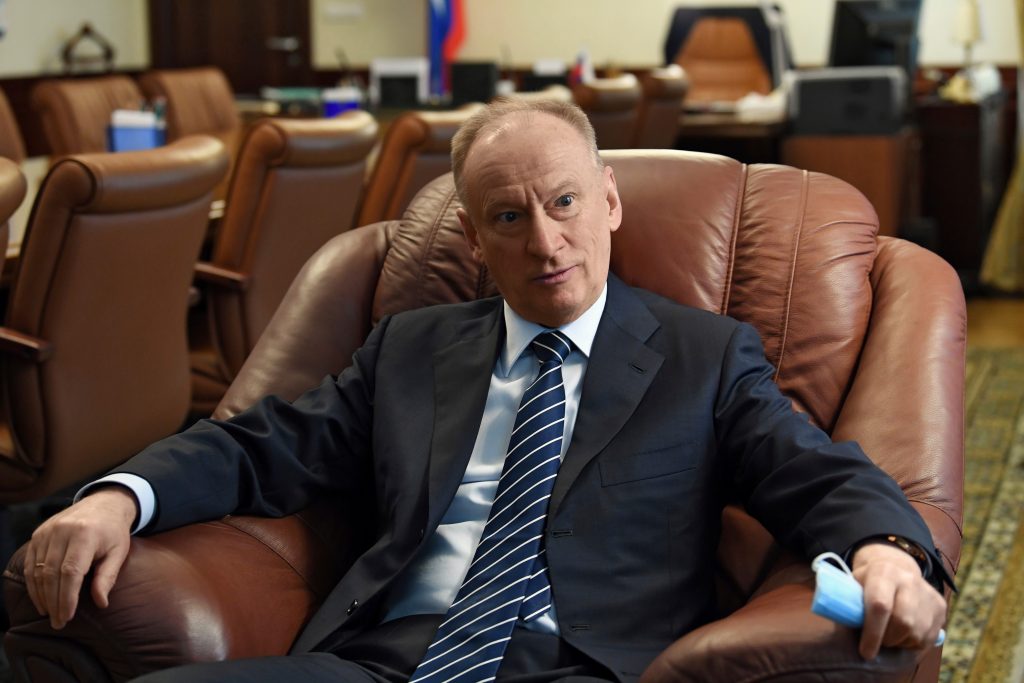
On Tuesday, April 2, an interview with Secretary of the Security Council of the Russian Federation Nikolai Patrushev was published on the website of the Argumenty i Fakty publication. This interview was timed to coincide with the 75th anniversary of NATO’s creation, which was celebrated on April 4. Accordingly, the main topic of the interview was Patrushev’s vision of the role this alliance played in world politics and how its main goal was to “restrain” Russia.
Key theses:
- “The anniversary of the formation of NATO practically coincided with the 25th anniversary of the large-scale bombing of Yugoslavia, when, under the guise of the slogan “defence of human rights and democracy,” NATO aircraft mercilessly dealt with unarmed people. As a result of the bombing, more than 2.5 thousand people were killed, and more than 12 thousand civilians were injured. The exact number of deaths during the operation has not yet been precisely established. The use of ammunition with depleted uranium has led to soil contamination and a manifold increase in cancer among the population, which continues to kill people a quarter of a century after NATO aggression.”
- “Over the 75 years, NATO has conducted more than 20 major military operations. In addition, individual countries of the alliance have repeatedly participated in non-aligned military coalitions formed by the United States to satisfy its global ambitions in various regions of the world – in Vietnam, Iraq, Libya, Afghanistan and dozens of other armed conflicts. Therefore, the bloc’s attempts to renounce the existing facts of the destruction of cities and countries, the extermination of thousands of civilians, and even more so to hush them up, sound absurd.”
- “I will not delve into NATO’s bloody history, but you need to know it to understand the alliance as a stable, long-term source of danger, crises, and conflicts.”
- “NATO’s entire policy is based on instructions from Washington. He uses the alliance to maintain his armed presence in Europe and demonstrate his satellites’ support for his indispensability in ensuring the security of this continent. In addition, the military bloc controlled by the United States is intended to exert unlawful pressure from the so-called “collective West” on the sovereign states of the world using military, economic, information and other resources.”
- “At one time, the United States, England and their satellites did not hesitate to falsely declare that the alliance was created to counter the “aggressive aspirations” of the Warsaw Pact. At the same time, they are silent that the Warsaw Pact was signed on May 14, 1955, six years after the formation of NATO. It is worth recalling that it was thanks to the formation of the Warsaw Pact that military parity was established in Europe for many years and peace was established.”
- “In the 90s, NATO members deliberately tried to convince us that they were pragmatists interested in unified military-political cooperation with Russia, maintaining peace and stability in Europe. The West considered the collapse of the Soviet Union only as one of the stages of the confrontation with Russia. The weakening of our country as an economic and political competitor and its subsequent removal from the world’s political map through dismemberment are the long-term strategic goals of Washington, London and the countries of the collective West controlled by them. That is why officials in Brussels have identified our state as the main source of threats to European security and explicitly enshrined this in NATO’s strategic concept.”
- “NATO is systematically strengthening its military potential along our borders from the Barents to the Black Sea. In the speeches of the leaders of the bloc countries and documents, even the term “NATO’s Eastern Flank” appeared, which includes all the countries of Eastern Europe bordering Russia and allied Belarus, as well as Romania and, more recently, Sweden and Finland. The alliance’s leadership does not hide the fact that the largest military manoeuvres near the Russian borders, Steadfast Defender 2024, currently taking place in Europe since the collapse of the USSR, are aimed precisely at “containing” Russia. Last year alone, NATO and its member countries conducted 130 coalition and more than 1 thousand national military exercises and training. Note, not for a decade, but for one year, 2023.”
- “NATO exercises began to take place regularly on the territory of Ukraine since 1995. In 2004, sacrificing the country’s sovereignty for the sake of the alliance, the Verkhovna Rada adopted a law on free access of NATO forces to the territory of Ukraine. The increased militarisation of Ukraine began after the “coup d’etat” carried out by the West in Kyiv in February 2014 and the genocide of the Russian-speaking population carried out by the “Ukronazis”. There is irrefutable evidence that Kyiv, at the United States and NATO instigation, intended to resolve the issue with the “obstinate” regions extremely harshly by force.”
- “The North Atlantic Alliance is de facto a party to the Ukrainian conflict and is actively involved in organising shelling of Russian territories by neo-Nazis. Within its framework, collective decisions are made on new supplies of weapons with an increase in their technical and long-range capabilities, and NATO instructors in several countries train mercenaries and saboteurs for their participation in anti-Russian operations.”
- “The plans of the United States and NATO include preserving Ukraine, or at least part of it, as an anti-Russian territory entirely under their control, completely dedicated to serving the interests of the North Atlantic bloc. In this regard, the tasks of demilitarising Ukraine remain relevant.”
- “NATO defense spending this year has increased to 50% of the global total. The alliance budget has grown for the ninth year in a row and amounted to more than $1.1 trillion in 2023.”
- “The other day, the Prime Minister of Estonia announced that she was increasing military spending and increasing taxes in the country for this. She is forced to commit this act of political suicide since members of the alliance are obliged to submit to “bloc” discipline, increasing military spending. This year, 18 alliance countries have already fulfilled Washington’s “instructions” by increasing spending on NATO military needs to 2% of GDP.”
- “The European countries of the bloc have long lost many elements of their sovereignty and are only the economic and political support of the alliance. Under these conditions, all NATO’s military plans are meekly carried out by the European authorities, for whom the ideals of independence and responsibility to the population of their own countries and their future have given way to the desire to please the global claims of Washington.”
Outcomes and outlook:
Patrushev further demonstrates his influence and tries to show that his political weight remains the same – despite the mistakes of his wards from the security bloc. He focuses on geopolitical issues, acting as a harsh critic of NATO. Moreover, the corresponding date is just approaching – the 75th anniversary of the creation of the NATO bloc and the signing of the Washington Treaty of 1949. Today, from Russia’s point of view, NATO is the main adversary and adversary. Preventing the expansion of NATO to the East is the main topic, and by “East”, we mean three states – Ukraine, Moldova and Belarus (to a lesser extent, the republics of the South Caucasus). The expansion of NATO to include the Warsaw Pact states, the Baltic states and even Finland was not perceived by Russia as painfully as NATO’s attempts to dominate Ukraine, Belarus or Moldova. This is fundamental for Russia. And Patrushev is trying in every possible way to show that the future of these states will depend solely on how relations between Russia and NATO develop.
- New declarations about readiness to negotiate a cessation of hostilities in Ukraine
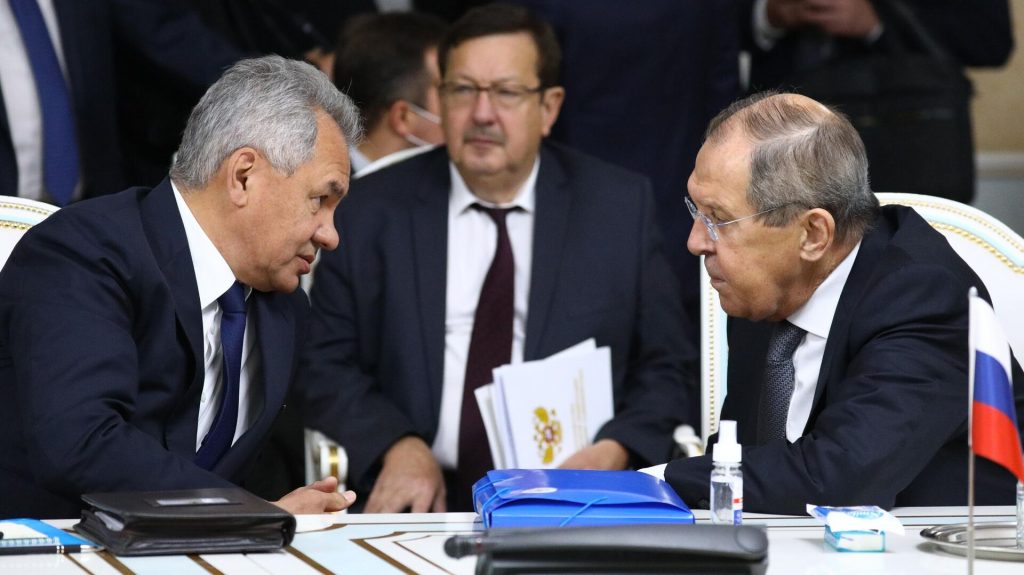
On Thursday, April 4, following a telephone conversation between the Ministers of Defense of France and Russia, a press release appeared on the website of the Russian department which, in particular, noted that the head of the French Ministry of the Armed Forces, during a telephone conversation with Shoigu, noted his readiness for dialogue on Ukraine, based on the Istanbul peace initiative (it provided for the neutral status of Ukraine). The report also says that Shoigu warned Lecornu that if plans to send a French contingent to Ukraine are implemented, this will create problems for France itself. Shoigu also said holding a meeting in Geneva on Ukraine without Russia’s participation is pointless.
At the same time, the Russian Ministry of Defense said in a statement that negotiations between Shoigu and the French Armed Forces Minister took place at the “urgent request of the French side.” In the same conversation, Shoigu allegedly said that Russia “has information about the Ukrainian trace in organising the terrorist attack” and also noted that the investigation “will be completed.”
Still, a similar press release from the French side does not include information about readiness for negotiations. The final press release from the French department notes that Sebastian Lecornu, in a conversation with Sergei Shoigu, condemned the terrorist attack in the Moscow region. However, he confirmed that France does not have information to establish a connection between this attack and Ukraine. The French Defense Minister also announced his readiness to strengthen cooperation in the fight against terrorism, the French military department noted.
It is noteworthy that the very next day, April 5, Russian Foreign Minister Sergei Lavrov supported the Chinese peace plan, which implies a ceasefire along the front line without the withdrawal of Russian troops from the occupied territories of Ukraine. In particular, Lavrov said that “China has to date proposed the most clear and reasonable plan for a settlement around Ukraine.”
At the same time, Lavrov rejected a return to the February 2022 demarcation line, as Zelensky recently announced. “Dreaming is not harmful,” said the head of the Russian Foreign Ministry.
Outcomes and outlook:
Shoigu’s statements do not contain anything new. Russia has repeatedly spoken about its readiness to negotiate with Ukraine. Still, this is nothing more than negotiations on the surrender of Ukraine, which neither Ukraine nor the West can agree to. Russia is ready to consider several points: a) negotiations on the fate of Ukraine with the United States or NATO; b) recognition of current conquests as sovereign territories of the Russian Federation (state border along the current front line); c) demilitarisation of Ukraine; d) Ukraine’s refusal to join NATO and state neutrality according to the Austrian model. Therefore, all Russian statements regarding readiness for negotiations indicate precisely the opposite – Russia’s unpreparedness for honest negotiations based on international law and treaty obligations.

